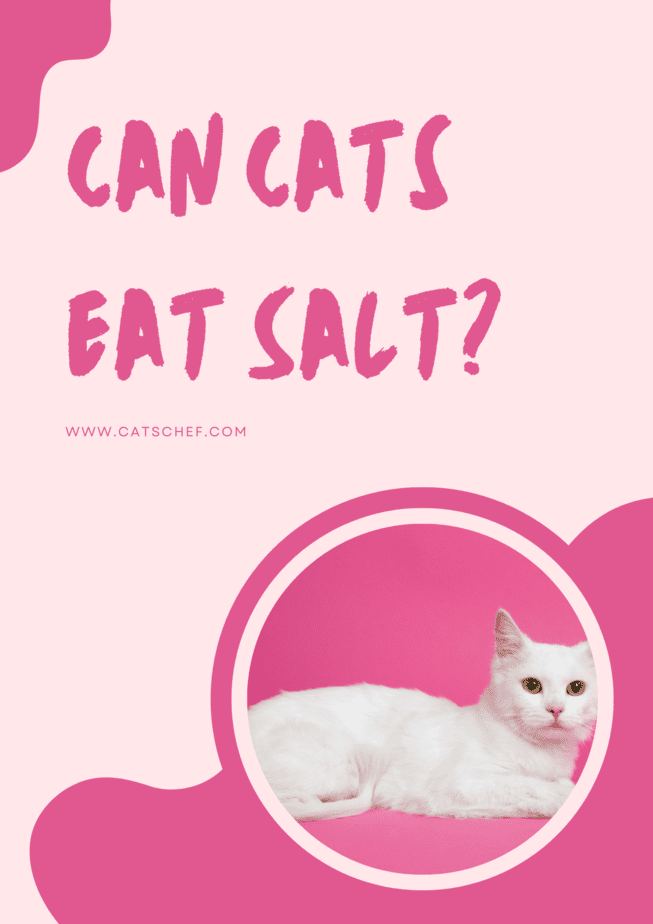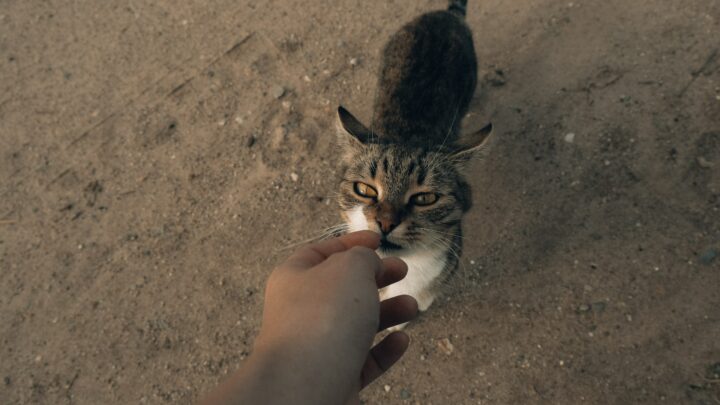Oh, Mrs. McFluffer… She keeps reaching her paws towards you trying to snatch a Lays Fried Pickles With Ranch potato chip out of your hand although she knows she’s on a strict Keto diet. She keeps giving you her “mommy please” looks as if she doesn’t care that salty snacks make her tummy sour. Can cats eat salt or any kind of food that contains salt?!
Let’s be honest, your cat certainly wants to. Whenever she’s bored with her regular (perfectly fine and fresh) cat food, she turns to you to ask for some she clearly isn’t supposed to munch on.
Trader Joe’s canned foods, her arch enemy’s (the dog, of course) dry foods that might or might not contain salt, or even your neighbor’s kid’s homemade playdough. And don’t even get me started on your pink Himalayan salt lamp!
Your curious creature wants to munch on pretty much everything she can get her paws on. She seems particularly enchanted with the taste of salt. So, it’s no wonder you’re spending your Friday afternoon looking for answers. Argh, can cats eat salt!?
We’ve got your back, but we can’t give you a simple yes or no answer. According to our friends over at the ASPCA (American Society for the Prevention of Cruelty to Animals, salt doesn’t fall under the category of things your cat shouldn’t put into her mouth.
But… There’s always a but when it comes to feeding your mischievous monster anything that isn’t supposed to be a part of a healthy cat’s diet. Here’s everything you need to know about the complicated relationship between your cat and your favorite pantry staple.
Why are cats so salty when eating salt?
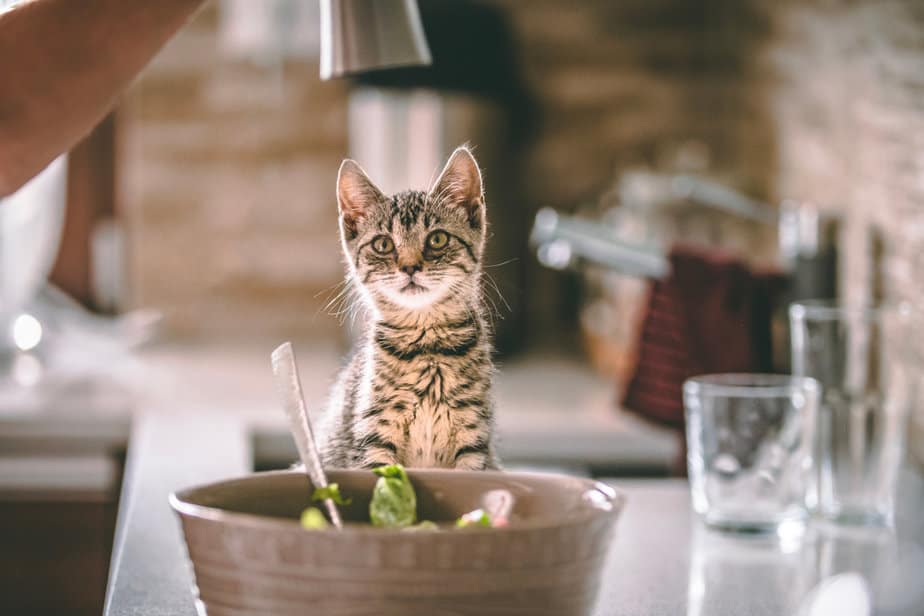
Can cats eat salt with no repercussions? Can cat food (or other pet food, for that matter) contain salt? You swear you’ve seen a certain amount (like 1% or 2%) of salt listed as one of the ingredients on the Purina Kit and Kaboodle kibble you purchased a couple of days ago!?
So, what’s the deal with cats and salt? Why are they so salty when eating salty snacks?
Cats are obligate carnivores. They require a bunch of meat, animal protein, and animal-sourced nutrients in their diets in order to survive. They don’t require fruits and veggies the same way humans do. And, they certainly don’t require salt, pepper, or other seasonings.
Actually, your feline friend’s digestive system doesn’t contain the enzymes necessary to break down and process most foods you feed off of on a regular basis. She might be a direct descendant of lions, but one too many pinches of salt will send her running to her litterbox.
That doesn’t mean that your furry friend shouldn’t have human foods AT ALL. But, you should keep an eye out for the amount of salt (rock salt, sea salt, table salt, or any other type) that’s typically contained within most human foods.
Human foods with a high salt content can cause an array of adverse reactions, some of which can have serious repercussions when left untreated. We’re talking about everything from excessive thirst and urination to hypernatremia, salt toxicity (salt poisoning), and brain swelling.
But, healthy cats can (and should) have a modest amount of salt every day. Anything ranging from 20 milligrams to 40 milligrams of salt a day shouldn’t cause any harm to your furry friend unless she’s already suffering from liver, kidney, or other diseases. So, can cats eat salt with no repercussions?
What’s so bad about salt?
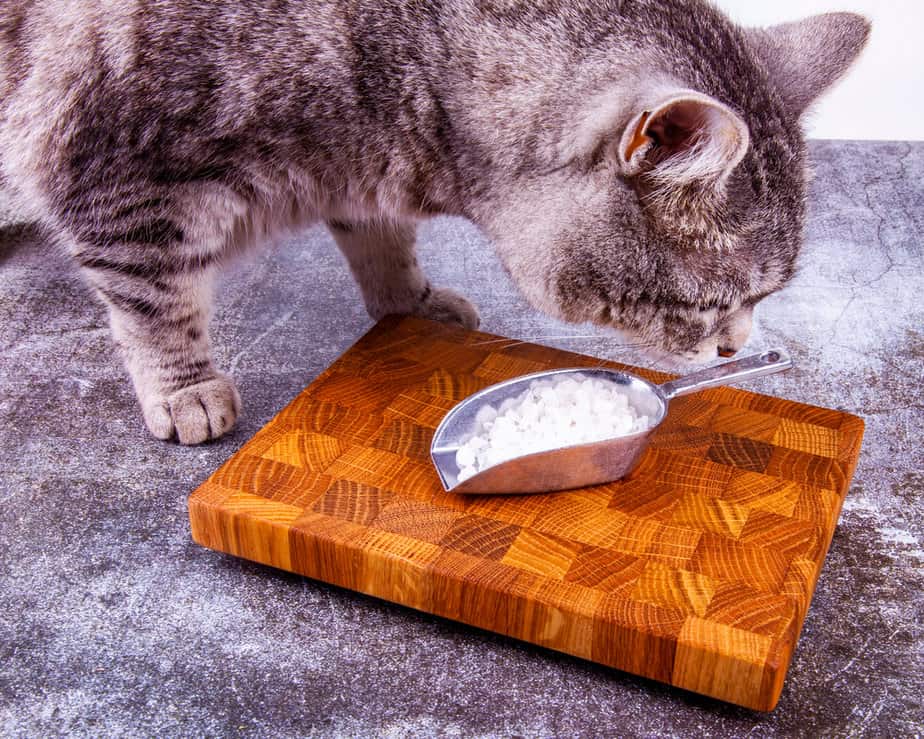
Trust me, next time Mrs. McFluffer decides she’s enchanted with your saltwater pool, you might want to take her away before she takes one too many licks. A little goes a long way when it comes to the ever-so-complicated relationship between cats and salt.
Salt, or sodium chloride for those of you who want to sound bad and boujee, can cause serious damage to your cat’s body. Your cat does require some sodium on a regular, but you’re better off keeping her on a low-sodium diet.
What do we mean when we say that? What makes salt bad for cats? What’s the main reason why you should keep your cat’s sodium intake to a minimum?
1. Hypernatremia
When your furry friend consumes a bunch of salty foods over a longer period of time, her sodium levels rise and her electrolytes become unbalanced. Such electrolyte imbalances can cause an array of health problems including hypernatremia and sodium (or salt) toxicity.
Hypernatremia happens when the sodium levels in your cat’s bloodstream rise over a certain level. This condition doesn’t affect healthy animals and only happens among animals that consume large amounts of salt (or added salt).
We put the emphasis on added because that’s the word that typically gets ignored when you’re throwing a quick glance at the ingredients list.
Some of the most common symptoms of hypernatremia include weakness, lethargy, incoordination, diarrhea, vomiting, tremors, and seizures. And don’t even get me started on excessive thirst and urination, high blood pressure, urinary tract disease, and heart disease.
Contact your vet as soon as you notice any of these symptoms. Plenty of fresh water, intravenous fluids (IV fluids), and supportive care should restore your cat’s sodium-water levels before you can say “Mrs. McFluffer, stop licking the salt lamp right now!”
Your cat’s health should be your number one priority. So, you might want to say no when the waiter asks whether you want some extra salt on your fries. Let’s keep that salt intake to a minimum, for both the fur baby and the fur parent.
2. Sodium (or salt) toxicity
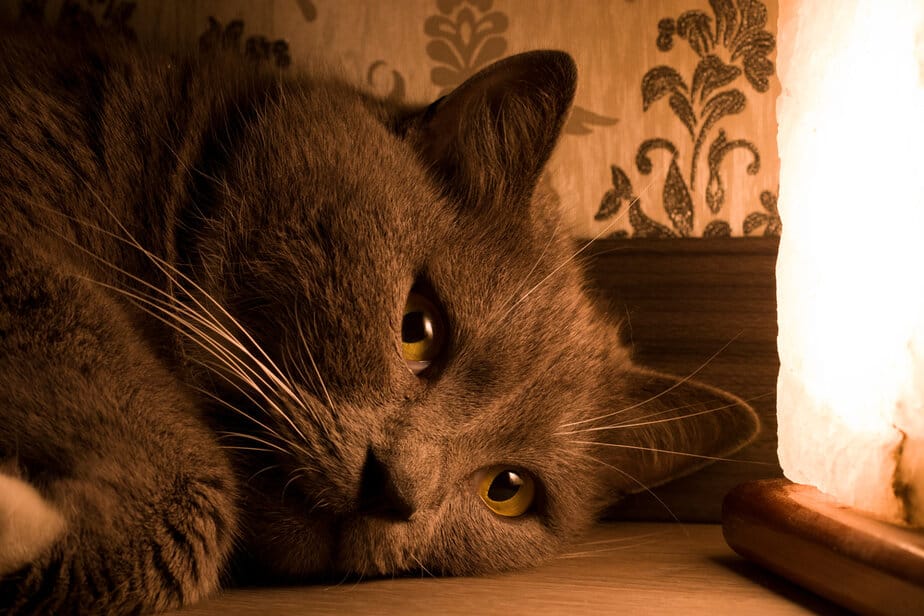
Apart from hypernatremia, electrolyte imbalances can also lead to a condition known as sodium toxicity, salt toxicity, or even salt poisoning. One thing’s for sure, you don’t want your precious purrincess dealing with either of them.
But, for the sake of keeping your cat happy and healthy, what are the most common symptoms of sodium toxicity? Vomiting, diarrhea, lethargy, weakness, incoordination, excessive thirst and urination, tremors, seizures, and coma are only some of the symptoms you might want to keep an eye out for.
And that’s only the case when we’re talking about healthy cats with no underlying issues. Let’s just say that you should get Mrs. McFluffer straight to the emergency animal center if she’s already battling liver, kidney, or urinary problems.
Other than that, contact your vet if you notice any of the symptoms we mentioned a paragraph or two ago. Consult with your vet before making any significant changes to your cat’s diet and make sure to take a closer look at the ingredients list.
You don’t want to miss any of those “added salt” or “added preservatives” signs.
3. Digestive problems
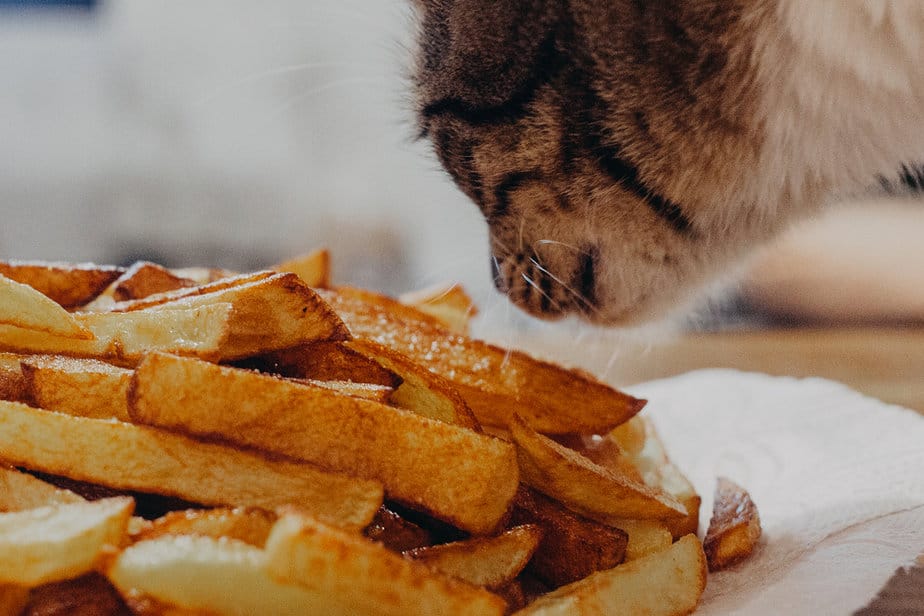
And, while we’re on the topic of “added ingredients”, we might as well discuss one of the main problems with excessive sodium consumption in cats. Unfortunately, a lot of the time cat parents aren’t even aware they’re feeding their babies foods that are high in sodium.
Your cat isn’t going to throw a glance around the kitchen, notice a thing of sea salt and ignore everything else. But, she’s probably going to notice a bag of Doritos on the kitchen counter or a plate of mashed potatoes on the dining table.
Either way, you understand what we’re trying to say. Most foods you eat on a daily basis contain way too much salt for you to share with your furry friend. You’re better off treating her with occasional, carefully crafted cat treats to avoid digestive issues that might arise from excessive salt consumption.
Additionally, you might wonder whether you should feed salt to your cat when you’re trying to induce vomiting. While there are some cases in which using salt proved helpful, the risks outweigh the benefits.
You’re better off giving your vet a quick visit and letting him deal with whatever seems to be the problem. You can use that as a general rule of thumb. Always consult with your vet before making any decisions that could affect your cat’s health.
Can cats eat table salt?
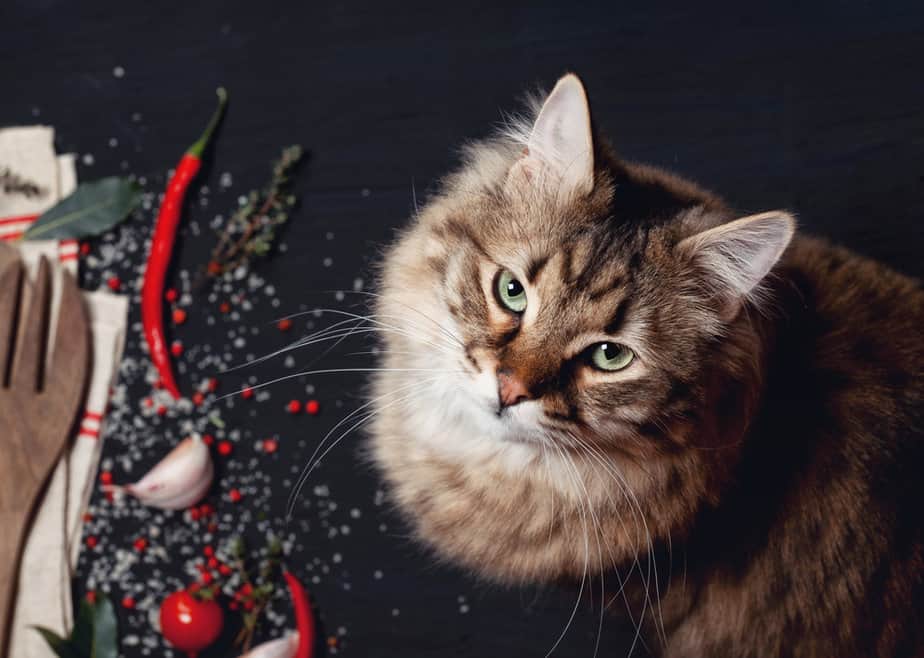
It’s safe to say that cats shouldn’t consume too much salt on a daily basis. But, you might be wondering whether it matters what type of salt they consume. Can cats eat table salt? What makes table salt different from other types of salt?
First things first, table salt isn’t something you and your cat aren’t familiar with. It’s the granulated white salt that’s typically found in saltshakers. It’s mined from underground salt deposits and devoid of other minerals.
And, it’s enriched with something called iodine (and no, you don’t have to remember the terminology).
Most importantly, table salt is the most common type of salt among humans. This means that when cat parents wonder whether cats can eat salt they’re typically referring to this type of salt.
And, to answer their question, cats can have a small amount of table salt without repercussions. Anything more than that might leave your furry friend with a bunch of digestive issues (or even symptoms of hypernatremia and sodium toxicity).
Table salt shouldn’t be a regular part of your cat’s diet but there’s no reason to panic on the off chance she licks a pinch from the kitchen counter.
What about rock salt?

Rock salt, as the name suggests, comes from rocks rather than minerals. Unlike table salt, it’s taken directly from the ground in order to retain its distinguishable crystalline form. So, can cats eat rock salt?
Here’s the thing, rock salt doesn’t seem to be recommended for human consumption, either. While you won’t get sick from adding a pinch of rock salt into your grandma’s pasta recipe, this particular type of salt typically contains minerals and impurities as it’s often left untreated.
What does that mean for you and your cat? First things first, if you’re planning on sharing your grandma’s pasta recipe with your feline friend, you might want to opt for purified rock salt. And, you also might want to add not more than a pinch (even if the recipe calls for more).
Everything we mentioned when we were talking about the negative effects of excessive amounts of salt on your cat applies to rock salt, as well. While a pinch or two shouldn’t cause adverse reactions, it’s better to keep those rock salt snacks to a minimum.
Can cats eat sea salt?
Who doesn’t love to sprinkle a generous amount of sea salt over their grilled cheese or tomato bruschetta!? Let’s be honest, sea salt holds a special place in our hearts, but should it hold a special place in your cat’s heart? Could sea salt be any different from other types of salt?
Sea salt gets evaporated from oceans, seas, and other saltwater sources. Actually, it’s pretty similar to rock salt in the way that it retains a lot of the other minerals. It’s less processed and purified, and it shouldn’t be consumed by your cat on a regular.
A little bit of sea salt every now and then shouldn’t cause any adverse reactions, but… It’s better to avoid feeding your cat anything that contains sea salt (or any other type of salt) because she already gets the necessary amount from her regular cat food.
Don’t forget, don’t make any significant changes to your cat’s diet without consulting with your vet beforehand. Sea salt might not be the worst thing your feline friend can munch on, but it’s better to stay on the safe side and avoid salty snacks.
And what about pepper and other seasonings?
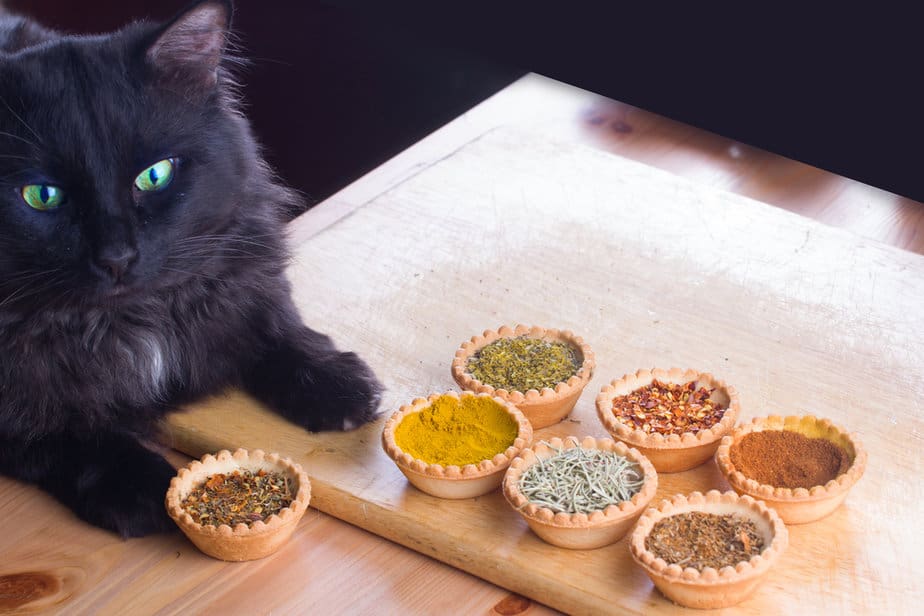
To everyone’s demise, it’s pretty clear you shouldn’t feed too much salt to your cat. Nobody wants her to spend the rest of the afternoon in her litterbox, of course. But, what’s the deal with other seasonings? Can cats eat black pepper? Can cats eat cayenne pepper?
Unfortunately, cats and seasonings don’t have a healthy relationship. Sure, your cat might perk her ears up and scrunch up her snout when she catches a whiff of whatever’s on the stove. But, that doesn’t mean that she should have a taste.
Seasonings such as salt, black pepper, or cayenne pepper shouldn’t cause harm to your feline. They aren’t considered particularly toxic, but they also aren’t recommended for feline consumption. She shouldn’t eat them regularly, but they’re safe from time to time.
On the other hand, seasoning such as onion powder and garlic powder might rush her to the emergency animal center. Onion powder and garlic powder are toxic to cats, and you shouldn’t let your cat consume them under any circumstances.
Keep up the good work with carefully crafted cat food and cat treats. Add an occasional unhealthy snack that isn’t going to send your cat running to her litterbox. And, of course, always keep an eye out for those hidden harmful ingredients listed on the back.
So, can cats eat salt?
Yes and no! As much as we would love to give you a black or white answer, that simply isn’t possible when we’re talking about this particular topic.
Your furry friend requires a certain amount of salt in her system to keep her happy and healthy. But, you should always make sure you don’t go overboard. Whether the two of you are fans of table salt, rock salt, or even sea salt, keep its consumption to a minimum.
